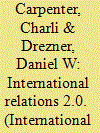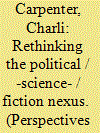|
|
|
Sort Order |
|
|
|
Items / Page
|
|
|
|
|
|
|
| Srl | Item |
| 1 |
ID:
181550


|
|
|
|
|
| Summary/Abstract |
What affects Americans’ sensitivity to international laws and norms on the use of force? A wealth of recent IR literature tackles this question through experimental surveys using fictional scenarios and treatments to explore precisely when Americans would approve of government policies that would violate the laws of war. We test whether such survey experiments may themselves be affecting public sensitivity to these norms—or even Americans’ understanding of the content of the norms themselves. We show that being invited to express a preference regarding war crimes in survey settings has a negative impact on Americans’ understanding of US legal and ethical obligations in war and that reporting previous findings can inflate support for war crimes. We conclude with suggestions for future experimental survey design in international relations and international law.
|
|
|
|
|
|
|
|
|
|
|
|
|
|
|
|
| 2 |
ID:
161429


|
|
|
|
|
| Summary/Abstract |
Some scholars suggest popular culture shapes public attitudes about foreign policy in ways that can affect real-world political outcomes, but relatively few studies test this proposition. We examine whether—and more importantly how—popular culture affects public opinion on foreign policy through a survey experiment on American attitudes toward fully autonomous weapons. We queried respondents about their consumption of popular culture—including a number of iconic science-fiction films featuring armed artificial intelligence (AI)—before or after questions about autonomous weapons. We find that science fiction “priming” exerts no independent effect on political attitudes, nor does referring to autonomous weapons as “killer robots.” However, consumption of frightening armed AI films is associated with greater opposition to autonomous weapons. This “sci-fi literacy” effect increases for the highest consumers of science fiction if they are “primed” about popular culture before reporting their attitudes—what we call the “sci-fi geek effect.” Our project advances current understanding of how popular culture affects public opinion on foreign policy and suggests avenues for further inquiry.
|
|
|
|
|
|
|
|
|
|
|
|
|
|
|
|
| 3 |
ID:
131511


|
|
|
|
|
| Publication |
2014.
|
| Summary/Abstract |
Through a series of focus groups with human security practitioners, we examined how powerful organizations at the center of advocacy networks select issues for attention. Participants emphasized five sets of factors: entrepreneur attributes, adopter attributes, the broader political context, issue attributes, and intranetwork relations. However, the last two were much more consistently invoked by practitioners in their evaluations of specific candidate issues. Scholars of global agenda setting should pay particular attention to how intranetwork relations structure gatekeeper preferences within transnational advocacy spaces because these help constitute perceptions of issues' and actors' attributes in networks.
|
|
|
|
|
|
|
|
|
|
|
|
|
|
|
|
| 4 |
ID:
097844


|
|
|
|
|
| Publication |
2010.
|
| Summary/Abstract |
The International Relations (IR) profession has not fully taken stock of the way in which user-driven information technologies-including Blogger, Facebook, Twitter, YouTube, and Wikipedia-are reshaping our professional activities, our subject matter, and even the constitutive rules of the discipline itself. In this study, we reflect on the ways in which our own roles and identities as IR scholars have evolved since the advent of "Web 2.0": the second revolution in communications technology that redefined the relationship between producers and consumers of online information. We focus on two types of new media particularly relevant to the practice and the profession of IR: blogs and social networking sites.
|
|
|
|
|
|
|
|
|
|
|
|
|
|
|
|
| 5 |
ID:
168793


|
|
|
|
|
| Summary/Abstract |
Climate change poses a grave security threat to national borders, habitats, and vulnerable people. Plagued by asymmetries in both states' vulnerability to climate impacts and their capacity to mitigate them, climate change presents states with a “wicked” problem that poses significant obstacles to interest-based solutions. Yet, most global climate change policy involves rationales and mechanisms grounded in an interest-based logic of consequences: information-sharing, reciprocity, and exchange. We argue that strategies that promote ethics-based discourse and policies offer considerable promise for hastening stronger global climate governance. We argue that successes in human security norm-building, including bans on land mines, cluster munitions, and nuclear weapons, provide climate scholars and practitioners with alternative governance models that rely on activating a logic of appropriateness and spearhead faster, more effective climate action. We identify five strategies that previous scholars have shown fostered efforts to promote a logic of appropriateness in human rights, humanitarian law, and disarmament. We examine the empirical experience of those strategies and particularly highlight the recent success of efforts to negotiate a treaty banning nuclear weapons. Given the success of these strategies in other issue areas, we argue scholars of climate change could fruitfully focus greater attention on political efforts that promote strong global ethical norms for climate action.
|
|
|
|
|
|
|
|
|
|
|
|
|
|
|
|
| 6 |
ID:
165329


|
|
|
|
|
| Summary/Abstract |
Public opinion polls on national security issues are often seen as indicators of the strength of international human rights norms. By contrast, we hypothesise that the very act of answering poll questions can weaken citizens’ understandings of important international human rights laws and norms in the very moment they are being measured. We ground this discussion empirically by analysing a new dataset of post-9/11 survey questions on two US national security policies at odds with international human rights norms: ‘enhanced interrogations’ and ‘targeted killing’. In so doing, we encourage a widened research agenda on how international legal and normative understandings are transmitted to the public through surveys. We conclude by highlighting substantive implications for norm scholars and policy implications for norm advocates.
|
|
|
|
|
|
|
|
|
|
|
|
|
|
|
|
| 7 |
ID:
145077


|
|
|
|
|
| Summary/Abstract |
A burgeoning literature in IR asserts there is a relationship between pop cultural artifacts and global policy processes, but this relationship is rarely explored using observational data. To fill this gap, I provide an evidence-based exploration of the relationship between science-fiction narratives and global public policy in an important emerging political arena: norm-building efforts around the prohibition of fully autonomous weapons. Drawing on in-depth interviews with advocacy elites, and participant-observation at key campaign events, I explore and expand on constitutive theories about the impact of science fiction on “real-world” politics.
|
|
|
|
|
|
|
|
|
|
|
|
|
|
|
|
| 8 |
ID:
175080


|
|
|
|
|
| Summary/Abstract |
In “Hiroshima in Iran: What Americans Really Think about Using Nuclear Weapons and Killing Noncombatants,” a pathbreaking survey of attitudes toward the laws of war published in the summer 2017 issue of International Security, Scott Sagan and Benjamin Valentino found that Americans are relatively insensitive to the targeting of civilian populations and to international norms and taboos against the use of nuclear weapons. We replicated a key question of this study, where respondents were asked if they would support saturation bombing an Iranian city to end a war. We also introduced some variations into the experiment to directly measure any potential influence of international norms and laws. Overall, our quantitative and qualitative findings are more optimistic than those of Sagan and Valentino's study: Americans do strongly believe it is wrong to target civilians. And in a real-life scenario such as this, a majority would likely oppose such a bombing. These findings suggest, however, that much depends on how survey questions are structured in measuring those preferences and whether legal or ethical considerations are part of any national conversation about war policy.
|
|
|
|
|
|
|
|
|
|
|
|
|
|
|
|
|
|
|
|
|